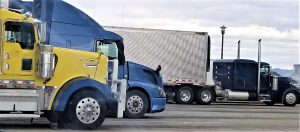
BRITISH COLUMBIA – A fleet of 65 heavy-duty trucks will be able to make the switch from diesel to hydrogen in northeastern BC with support from the Province’s Low Carbon Fuel Standard (LCFS).
Hydra Energy will receive LCFS credits worth a current market value of $1.9 million to build a hydrogen fuelling station in northeastern BC Trucks that rely on conventional diesel will be retrofitted to allow them to transition to low-carbon byproduct hydrogen that will be captured at a local sodium-chlorate facility. These retrofits will allow the trucks to use 40 per cent hydrogen fuel and will result in reducing emissions by 67 tonnes of carbon dioxide equivalent per truck per year. Hydra anticipates the facility will be operational by early 2023.
Hydra Energy was the first company to provide the technology for and fuel commercial co-combustion trucks in British Columbia. These trucks have driven over 200,000 kilometres.
“Hydra is proud to be in British Columbia, an ideal jurisdiction for the development of low-carbon hydrogen,” said Jessica Verhagen, CEO, Hydra Energy. “We hope to see BC’s approach replicated in Canada’s forthcoming clean fuel standard.”
The forthcoming BC hydrogen strategy will provide a roadmap for how the province can be a world leader in the production, use and export of renewable and low-carbon hydrogen. Shifting away from fossil fuels is critical for achieving net-zero emissions by 2050. Hydrogen is the only practical solution to decrease emissions in hard-to-decarbonize sectors, like medium- and heavy-duty transportation.
The Province is supporting this project with BC Low Carbon Fuel Standard credits. The BC LCFS offers credits to fuel suppliers undertaking actions to increase the use of low-carbon fuels that would not occur otherwise. The program is an important part of achieving the targets set out under CleanBC.
“By working with hydrogen suppliers and the trucking industry, we’re hauling BC toward a low-carbon future. Hydrogen fuels allow us to reduce emissions in our transportation sector,” said Bruce Ralston, Minister of Energy, Mines and Low Carbon Innovation. “This project demonstrates BC’s hydrogen opportunity, helps a business realize fuel cost savings and accelerates our transition to a cleaner economy.”
The LCFS requires fuel suppliers to reduce the carbon intensity of gasoline and diesel by 20 per cent by 2030.


